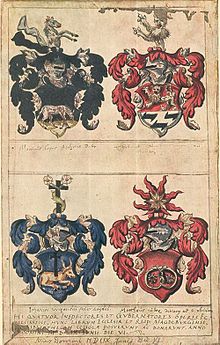
Back Магдэбургскія цэнтурыі Byelorussian Magdeburger Centurien German Centurias de Magdeburgo Spanish Centuries de Magdebourg French Historia Ecclesiae Christi Italian Centurie Magdeburskie Polish Магдебургские центурии Russian Magdeburgcenturierna Swedish Магдебурзькі центурії Ukrainian

The Magdeburg Centuries is an ecclesiastical history, divided into thirteen centuries, covering thirteen hundred years, ending in 1298; it was first published from 1559 to 1574. It was compiled by several Lutheran scholars in Magdeburg, known as the Centuriators of Magdeburg. The chief of the Centuriators was Matthias Flacius.[1] Lutheran theologian Werner Elert argued that due to its revolutionary critical method of presenting history, it is the basis of all modern church history.[2] It is said that Baronius undertook his Annales Ecclesiastici purely to oppose the Magdeburg Centuriators.[1]
- ^ a b
 This article incorporates text from a publication now in the public domain: Chambers, Ephraim, ed. (1728). "Magdeburg Centuries". Cyclopædia, or an Universal Dictionary of Arts and Sciences (1st ed.). James and John Knapton, et al.
This article incorporates text from a publication now in the public domain: Chambers, Ephraim, ed. (1728). "Magdeburg Centuries". Cyclopædia, or an Universal Dictionary of Arts and Sciences (1st ed.). James and John Knapton, et al.
- ^ Morphologie des Luthertums [The Shaping of Lutheranism], (Munich: C.H. Beck'sche Verlagsbuchhandlung, 1931–32): Volume 1: Theologie und Weltanschauung des Luthertums hauptsächlich im 16. und 17. Jahrhundert [The Theology and World View of Lutheranism Mainly in the 16th and 17th Centuries]: translated by Walter A. Hansen: Werner Elert, The Structure of Lutheranism: The Theology and Philosophy of Life of Lutheranism Especially in the Sixteenth and Seventeenth Centuries, Walter R. Hansen, (St. Louis: CPH, 1962). p. 485